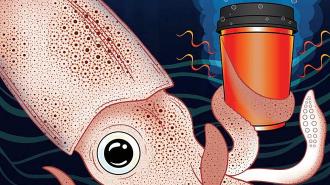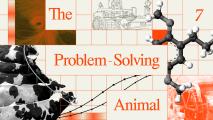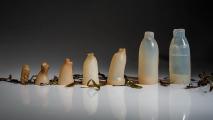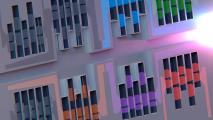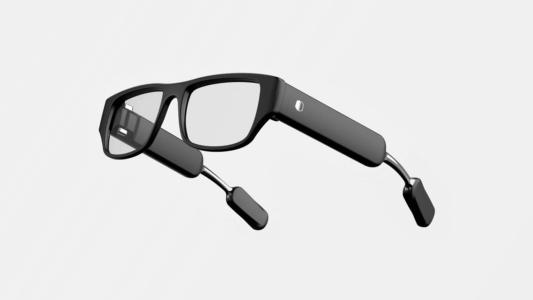Inspired by squid skin, engineers at UC Irvine have created a cheap, easy-to-recycle material that can be “tuned” to regulate heat. As insulation for food and beverage packages, it could ensure that whatever is inside cools at the perfect rate.
The muse: Squid are able to quickly change color thanks to tiny, pigment-filled sacs in their skin called “chromatophores.”
When a squid wants to change color — to escape a predator or sneak up on prey — it uses its muscles to expand or contract these sacs. That alters how light interacts with the pigments in them, which changes the squid’s appearance.
When the material is stretched, more heat escapes. When it’s relaxed, the transfer of heat slows.
The idea: The UC Irvine team’s material mimics the chromatophores in squid skin, but instead of regulating light, it regulates heat.
To create it, they deposited copper structures onto a flexible aluminum foil substrate, coated the structures with a polymer, and then delaminated the resulting material from the substrate.
When the material is stretched, the copper structures separate and let more heat escape from one side of the material to the other. When it’s relaxed, the structures come back together to slow the transfer of heat.
The applications: The UC Irvine team says the material could be used to insulate shipping containers, restaurant to-go bags, and parcel boxes containing perishable goods. In their paper, they demonstrate how it can be wrapped around cups to control how quickly beverages in them cool.
“You could have a temperature ‘ruler’ marked on the outside of the cup,” lead researcher Alon Gorodetsky explained to Freethink when asked about how consumers might use the material.
“Based on the temperature at which you want to drink your coffee at a specific time — say 150 degree Fahrenheit after 20 minutes — you could stretch and clip the material to a mark on the ruler that lets the coffee cool to the desired temperature at the right rate.”
“Now that we can make large sheets of it at a time, we have something that can benefit many aspects of our lives.”
Alon Gorodetsky
Scaling up: The basic materials cost just $.10 per square meter, and the price would go down as production scaled up. The squid skin-inspired material is easy to recycle, too: to separate the copper from the foil, just add vinegar.
“We have been working with cephalopod-inspired adaptive materials and systems for years but previously have only been able to fabricate them over relatively small areas,” said Gorodetsky.
“Now that we can make large sheets of it at a time, we have something that can benefit many aspects of our lives,” he added.
Update, 4/7/22, 11:40 a.m. ET: This article was updated with additional details on the material’s production process.
We’d love to hear from you! If you have a comment about this article or if you have a tip for a future Freethink story, please email us at [email protected].
